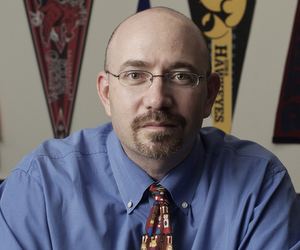
Mike Feinberg (via tulane.edu)
The idea of society providing a quality, comprehensive education for all children is inspiring and attainable, but the old model for delivering that education — a monolithic government entity led by politicians with a captive audience of students forced into grossly unequal schools — has got to go, one of the nation’s pioneers in public school reform told a Tulane audience on Thursday.
“We need to get rid of the government monopoly,” said Dr. Mike Feinberg, co-founder of the KIPP (Knowledge Is Power Program) Foundation.
Charter schools in general and KIPP’s model in particular have drawn their share of criticism, but the system’s results in New Orleans have been worthy of consideration. KIPP Central City Primary’s 2010 school-performance score of 120 was just higher than some of the most sought-after schools in the city (including Audubon Charter, Hynes Elementary, “Baby Ben” Franklin Elementary and the International School of Louisiana). KIPP Believe on South Carrollton posted a 106, also among the city’s upper echelon, and the scores in the high 80s of KIPP Central City Academy and KIPP McDonogh 15 are lower-performing by state standards but still well above “failing” and in the top 20 percent in New Orleans. KIPP has several other campuses too new to have received ratings, and is applying for more schools still.
KIPP’s educational philosophy has five main components, Feinberg said: a longer school day, more freedom for individual school leaders in exchange for a higher accountability for results, a basic goal of college readiness for all students, a focus on results and a commitment to expanding the educational options for parents everywhere. With 109 schools in 20 states, the system is currently serving 2,500 students in New Orleans (about 6 percent of the city’s students), with a waitlist of 500 more.
“The only way we’ll catch up with the wait list is if the other schools get better,” giving parents good options other than KIPP, Feinberg said.
New Orleans and Houston, where Feinberg is superintendent over 7,000 KIPPsters, are at the forefront of forcing that change, he said. He estimates that KIPP will need about 10 percent of the students in a community to really put pressure on the system as a whole, and in Houston, he is already seeing some evidence of that, as the traditional direct-run schools have begun emulating KIPP policies, putting up posters about colleges instead of standardized tests and sending teachers on visits to new students’ homes.
Feinberg also took a number of questions from the audience, discussing issues such as discipline, character education, parental involvement, teacher salaries and the role of the arts. To read a recap of our live coverage of Feinberg’s presentation, click “Replay” in the box below.
“a basic goal of college readiness for all students”
I pretty well stopped reading at this point. Roughly a quarter of Americans have a bachelor’s degree, and yet somehow we’ve managed to avoid having a 75% poverty rate. This is frankly a classist concept that kids won’t have a future unless they’re college graduates. Nonsense. Much of what’s learned in college is superfluous for day to day life, particularly for those who work a trade rather than joining the “professional” class.
There will always be a need for electricians, carpenters, mechanics, and plumbers. You can’t outsource those jobs to India. And frankly, many kids who don’t have an aptitude for science or literature have a great aptitude for the above listed trades. It’s utter classism to look down one’s nose at working a trade, as though an electrician with an associate’s degree who makes $40,000 a year is any less accomplished than an educator with a bachelor’s degree who makes the same.
No, we need to stop with this mindset of trying to send every child to college. Most jobs don’t require a college education. Most jobs require a specific skill, and if a child shows an aptitude for mechanics, they should be encouraged to pursue it and nurture it, not told that they’re less intelligent because they can’t recite Shakespeare. Tell me how many of those literature or poli sci majors can even change their own oil.
Darrell, all of your points are well taken, but it’s worth pointing out that Feinberg was not suggesting everyone be a college graduate. He actually said he believes the opposite, just like you. But he says the school system should not make that choice for students, that the goal should be for them to be prepared to go if that’s what they want to do – hence college “readiness.”
Good to know, and thank you for that clarification. My twin brother and I are actually a prime example of this, where I opted more for a college-oriented track and he opted for a more technical track. I ended up going to college and he went to techinical school. My career in IT and his in instrumentation pay roughly the same, although his cost of living in Menominee, MI is lower than mine in New Orleans, so I think he’s coming out a little bit ahead.
And no, I still don’t know how to change my own oil. 🙂
But in many articles like this I hear very little about placing any emphasis on preparing kids for a technical track, as though these things will take care of themselves. A college track is, frankly, a minority path.
So preparation for college is preparation for life, regardless of what choices students care about learning? Other career field, such as auto mechanics, could require other curricular choices beyond the 10 hour days of test prep, yes. And who can claim with a straight face that KIPP’s model of parrot learning in total compliance behavioral lockdowns could ever prepare children for the kind of independent thinking that college requires? Of course, Feinberg knows this, but then behavioral control masking as character education is the goal of these corporate chain gangs, anyway. Work hard, be nice.